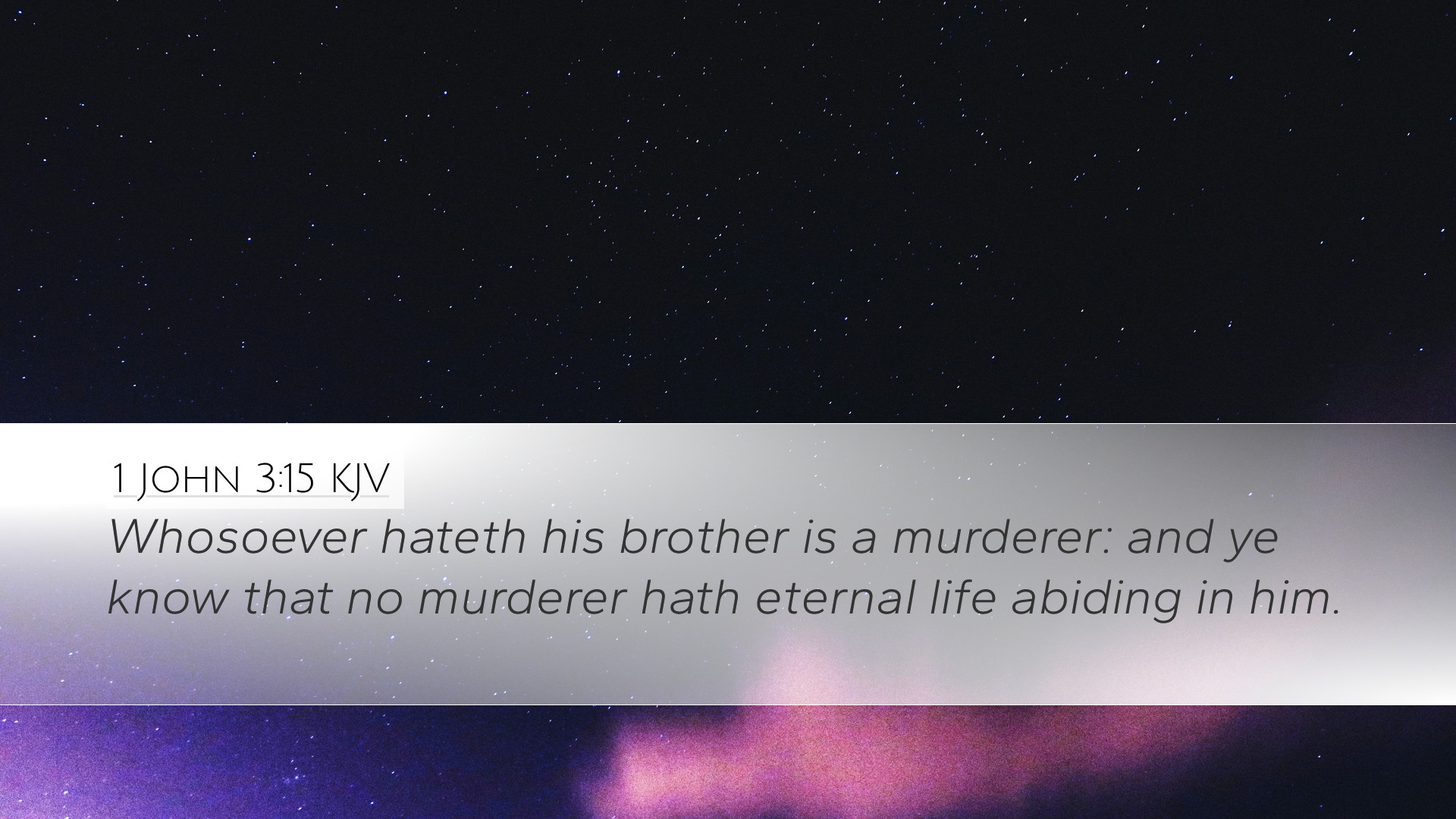Old Testament
Genesis Exodus Leviticus Numbers Deuteronomy Joshua Judges Ruth 1 Samuel 2 Samuel 1 Kings 2 Kings 1 Chronicles 2 Chronicles Ezra Nehemiah Esther Job Psalms Proverbs Ecclesiastes Song of Solomon Isaiah Jeremiah Lamentations Ezekiel Daniel Hosea Joel Amos Obadiah Jonah Micah Nahum Habakkuk Zephaniah Haggai Zechariah Malachi1 John 3:15
1 John 3:15 KJV
Whosoever hateth his brother is a murderer: and ye know that no murderer hath eternal life abiding in him.
1 John 3:15 Bible Commentary
Commentary on 1 John 3:15
Bible Verse: "Whoever hates his brother is a murderer, and you know that no murderer has eternal life abiding in him." (1 John 3:15, ESV)
Introduction
This verse serves as a profound reflection on the nature of love and hatred in the Christian community. John’s teaching summarizes a key tenet of Christian ethics: the importance of love towards others, particularly fellow believers. The statement connects the act of hatred to moral culpability akin to murder, and it emphasizes the spiritual consequences of harboring such ill feelings. This commentary synthesizes insights from notable public domain sources to elucidate the theological implications of this verse.
Contextual Background
1 John is a pastoral letter emphasizing the reality of Christian fellowship and the necessity of living in love as an expression of the believer's relationship with God. In previous passages, John emphasizes the importance of abiding in God and loving one another. The verse in question serves as a stark warning about the dangers of unresolved hatred and its place in the community of believers.
Insights from Commentary
Matthew Henry's Commentary
Matthew Henry emphasizes the gravity of hatred, equating it with the intent and spirit of murder. According to Henry, hatred is a serious sin that places an individual outside the fellowship of eternal life, which is a gift reserved for those who reflect God's love. He articulates that the heart's disposition is of paramount importance in the eyes of God, who examines not just actions but intentions.
- Sinful Nature: Henry points out that hatred stems from mankind’s fallen nature, summarizing it as a spiritual state incompatible with eternal life.
- Spiritual Consequences: He warns that harboring hatred results in a spiritual death, underlining the necessity of love as evidence of true fellowship with God.
Albert Barnes' Notes
Albert Barnes adds to the discussion by explaining that hatred in the heart is a manifestation of a deeper spiritual ailment. He indicates that John uses the extreme analogy of murder to illustrate the true nature of interpersonal sin among Christians. Barnes reflects on the moral implications, noting that to hate a brother is to violate the very essence of Christ's commandment of love.
- Pursuit of Righteousness: Barnes expresses that love should be pursued actively, contrasting it with hatred which destroys spiritual well-being.
- Community Implications: He notes the ramifications of hatred on the Christian community, urging believers to guard their hearts and maintain unity through love.
Adam Clarke's Commentary
Adam Clarke provides a linguistic and cultural analysis of the term "murderer," drawing attention to its roots in the teachings of Jesus as found in Matthew 5:21-22, where hatred itself is met with divine condemnation. Clarke posits that John’s statement serves to reiterate Jesus’ revolutionary teaching, challenging the audience’s ethical and moral perceptions.
- Ethical Teachings of Jesus: He emphasizes that Jesus transformed the understanding of the law, focusing on inner purity rather than just external actions.
- Self-Examination: Clarke encourages believers to reflect on their attitudes and feelings towards others and to seek reconciliation as an expression of their faith.
Theological Themes
Several theological themes are woven into this verse, highlighting the complexity of human relationships in light of divine command:
- Divine Love vs. Human Hatred: The stark contrast between the nature of God—who is love—and the destructive nature of hatred provides a framework for understanding moral accountability.
- Assurance of Eternal Life: John’s assertion that no murderer has eternal life presents the necessity of love as indicative of genuine faith.
- Communal Responsibility: This verse serves as a call for the Christian community to actively cultivate love and to confront the presence of hatred within their midst.
Practical Application for Believers
The implications of 1 John 3:15 resonate deeply within pastoral care, theological education, and personal discipleship. Practical applications include:
- Encouraging Forgiveness: Pastors should emphasize the importance of forgiveness and actively guide their congregations towards reconciliation.
- Teaching on Love: Theological educators are called to explore what it means to love in action, encouraging students to embody the love of Christ in their interactions.
- Personal Reflection: Believers are invited to examine their own hearts and relationships, seeking the grace to overcome hatred and foster an atmosphere of love.
Conclusion
1 John 3:15 serves as a stark reminder of the seriousness of our feelings towards others, highlighting that hatred fundamentally contradicts the message of the Gospel. Encouraged by the insights from Matthew Henry, Albert Barnes, and Adam Clarke, believers are admonished to live in love, reflecting the character of God in their communities. This verse challenges each Christian to introspectively evaluate their relationships and to uphold the call to love, thereby ensuring that they walk in the assurance of eternal life as children of God.


